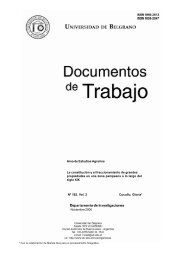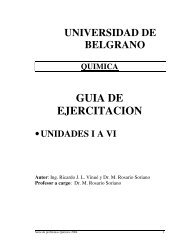Contrato de trabajo entre The Estee Lauder Companies, Inc. y ...
Contrato de trabajo entre The Estee Lauder Companies, Inc. y ...
Contrato de trabajo entre The Estee Lauder Companies, Inc. y ...
You also want an ePaper? Increase the reach of your titles
YUMPU automatically turns print PDFs into web optimized ePapers that Google loves.
Tesinas <strong>Contrato</strong> <strong>de</strong> <strong>trabajo</strong> <strong>entre</strong> <strong>The</strong> <strong>Estee</strong> Lau<strong>de</strong>r <strong>Companies</strong>, <strong>Inc</strong>. y Daniel J. Brestle<br />
total <strong>entre</strong> significado y significante, son abundantes las expresiones polisémicas que encontramos en<br />
él (Alcaraz Varó, op. cit.: 84).<br />
Este es el caso <strong>de</strong> “<strong>de</strong>termination”, que se utiliza en el texto con significados diferentes. En el Artículo<br />
6(d)(iv), página 19, dicho término podría <strong>de</strong>finirse como “the <strong>de</strong>cision of a court or administrative agency”<br />
(Black’s Law Dictionary, 1990):<br />
“(B) has a material adverse impact on the business or reputation of the Company or any of its subsidiaries<br />
or affiliates (such <strong>de</strong>termination to be ma<strong>de</strong> by the Company’s Board of Directors in its reasonable<br />
judgment)”.<br />
34<br />
Tiendo en cuento lo anterior, <strong>de</strong>cidí traducirlo como “<strong>de</strong>cisión”:<br />
“(B) tenga consecuencias significativamente negativas respecto <strong>de</strong> las activida<strong>de</strong>s comerciales o el buen nombre<br />
<strong>de</strong> la Compañía, <strong>de</strong> cualquiera <strong>de</strong> sus subsidiarias o filiales (dicha <strong>de</strong>cisión quedará en manos <strong>de</strong>l Directorio <strong>de</strong> la<br />
Compañía, según un criterio razonable)”.<br />
No obstante, en el Artículo 7(a)(ii), página 21, “<strong>de</strong>termination” podría tener el mismo significado que<br />
en la oración citada, o bien, referirse a lo que el Black’s Law Dictionary (op. cit.) <strong>de</strong>fine como “the ending<br />
or expiration of an estate or interest in property, or of a right, power or authority. <strong>The</strong> coming to an end in<br />
any way whatever”:<br />
“Notwithstanding anything to the contrary contained in this Section 7, the Executive may disclose any Protected<br />
Information to the extent required by court or<strong>de</strong>r or <strong>de</strong>cree or by the rules and regulations of a governmental agency<br />
or as otherwise required by law or to his legal counsel and, in connection with a <strong>de</strong>termination un<strong>de</strong>r Section 6(h), to<br />
accounting experts”.<br />
En este caso, surgió un problema adicional; el inciso (h), al que se hace referencia, no figura en el contrato.<br />
Este error <strong>de</strong>l original dificulta la interpretación <strong>de</strong>l término que analizamos. Sin embargo, teniendo<br />
en cuenta que el Artículo 6 trata las causales <strong>de</strong> extinción, consi<strong>de</strong>ro que se aplica la segunda acepción<br />
y, por lo tanto, la traducción más a<strong>de</strong>cuada es “extinción”:<br />
“No obstante cualquier disposición en contrario contenida en este Artículo 7, el Ejecutivo podrá revelar Información<br />
Protegida en la medida que así lo exija una resolución o sentencia judicial, las normas y reglamentaciones <strong>de</strong> un<br />
organismo público, o según lo exija la ley. También podrá revelar este tipo <strong>de</strong> información a su asesor jurídico y, en<br />
caso <strong>de</strong> extinción en virtud <strong>de</strong>l Artículo 6(h) [sic], a peritos contables”.<br />
d) Repetición <strong>de</strong> palabras y estructuras<br />
Según Alcaraz Varó, la sintaxis <strong>de</strong>l inglés jurídico se caracteriza por la repetición <strong>de</strong> palabras o <strong>de</strong><br />
construcciones sintácticas que en español suelen evitarse. Debido a esto, recomienda la utilización <strong>de</strong><br />
términos o giros, como “aludido”, “mencionado”, u otros recursos para evitar la carga que genera dicha<br />
repetición. Sin embargo admite que, a veces, la repetición se vuelve inevitable (op. cit.: 80, 92). Veamos<br />
el siguiente ejemplo <strong>de</strong>l Artículo 7(b), página 23:<br />
“<strong>The</strong> Executive shall promptly and fully disclose all future material Developments to the Board of Directors of the<br />
Company and, at any time upon request and at the expense of the Company, shall execute, acknowledge and <strong>de</strong>liver<br />
to the Company all instruments that the Company shall prepare, give evi<strong>de</strong>nce and take all other actions that are<br />
necessary or <strong>de</strong>sirable in the reasonable opinion of the Company to enable the Company to file and prosecute applications<br />
for and to acquire, maintain and enforce all letters patent and tra<strong>de</strong>mark registrations or copyrights covering<br />
the Developments in all countries in which the same are <strong>de</strong>emed necessary by the Company”.<br />
El fragmento citado no da lugar a confusión en cuanto a la referencia, es <strong>de</strong>cir, enten<strong>de</strong>mos perfectamente<br />
si se habla <strong>de</strong> la compañía o <strong>de</strong>l ejecutivo. Por lo tanto, en el intento por no repetir, no <strong>de</strong>bemos<br />
generar ninguna ambigüedad que no exista en el original. Al mismo tiempo, tampoco <strong>de</strong>bemos abusar<br />
<strong>de</strong> las sustituciones porque le quitarían naturalidad al texto. Teniendo esto en cuenta, en algunos casos,<br />
reemplacé “la Compañía” por “ésta”, “ella” o “dicha Compañía” y, en otros, repetí la expresión, la sustituí<br />
por un pronombre o usé un sujeto tácito.

















